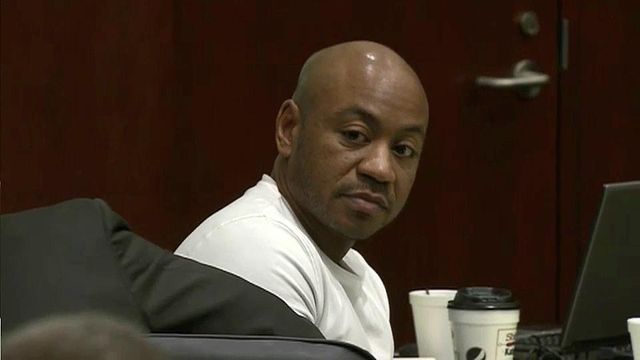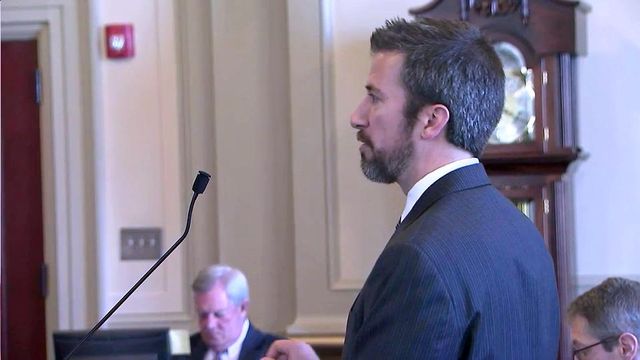Police testimony, psychological report basis of Grant Hayes' bid for new trial
Grant Hayes, serving life in prison for the grisly death of his ex-girlfriend nearly four years ago, had his bid for a new trial heard Wednesday before a three-member panel of the North Carolina Court of Appeals.
Posted — UpdatedGrant Hayes, 35, claims a judge improperly ruled on several matters in his 2013 trial when a Wake County jury found him guilty of first-degree murder in the July 13, 2011, death of Laura Ackerson.
Prosecutors argued that Hayes lured the 27-year-old – the mother of two of his children – to his Raleigh apartment, killed her and then tried to cover up the crime by dumping her dismembered body in a Texas creek across the street from his sister-in-law's home.
Hayes' attorney, Glenn Gerding, told the three-member appeals panel Wednesday that part of Raleigh homicide detective Jerry Faulk's testimony – meant to bolster the credibility of jailhouse informant Pablo Trinidad – was hearsay and should not have been presented to the jury.
A key witness in the trial, Trinidad said Hayes admitted to killing Ackerson and provided him details of her death that had not been released in the media.
The hearsay, Gerding argued, came in when Faulk testified that the information Trinidad provided was consistent with what he also had told a federal agent in 2012.
Faulk was not present for that federal interview.
"Detective Faulk was allowed to testify as to what a federal investigator told him that Mr. Trinidad told the federal investigator at an interview where Detective Faulk was not present, and that is classic hearsay," Gerding said.
Arguing on behalf of the state, Assistant Attorney General Derrick Mertz countered, saying Faulk never revealed any details of that conversation.
"Detective Faulk never testified about the content of the statement Pablo Trinidad gave to federal authorities at that time," Mertz said. "There was no hearsay in the line of questioning.
"What he told federal authorities never came into evidence," Mertz added.
Both Hayes and Ackerson had been battling for custody of their two young sons and, as part of that fight, they submitted to a court-ordered psychological evaluation that resulted in a report that was favorable to Ackerson.
Wake prosecutors contended that it angered Hayes, who wanted Ackerson out of his life, and that the report was a likely motive for him to kill her.
That report was the second issue before the Court of Appeals.
"Contents of the report that Dr. (Ginger) Calloway testified to were inflammatory and highly prejudicial," Gerding argued. "She discussed a number of things in this report that had no evidentiary value to the state's case."
Gerding said jurors learned about Hayes' admitted drug use, his mental health and other matters that should have been redacted or kept from the jury.
"The state went beyond simply saying, 'Here was a report that was favorable to Ms. Ackerson. It was negative to Mr. Hayes,'" Gerding added. "Instead of confining it to just that, they went into the specifics of his psychological condition. They went into his character for truthfulness."
But the report was relevant, Mertz said, because Calloway's findings could have meant that both Hayes and Ackerson might have had to at least share custody of the children.
"This is a woman he despised. He wanted not just the custody arrangement he had, he wanted her to play no part in their lives," Mertz said. "The jury did not convict because they may have known he had a 2007 DWI … They convicted him because he had the motive to kill her."
Hayes has denied killing Ackerson, saying that he helped cover up her death to protect his then-wife, Amanda Hayes, who he claims killed Ackerson during an argument.
At her trial last year, however, Amanda Hayes told jurors that she only helped cover up the crime because Grant Hayes threatened her.
It could be several months before the Court of Appeals issues an opinion.
• Credits
Copyright 2024 by Capitol Broadcasting Company. All rights reserved. This material may not be published, broadcast, rewritten or redistributed.





